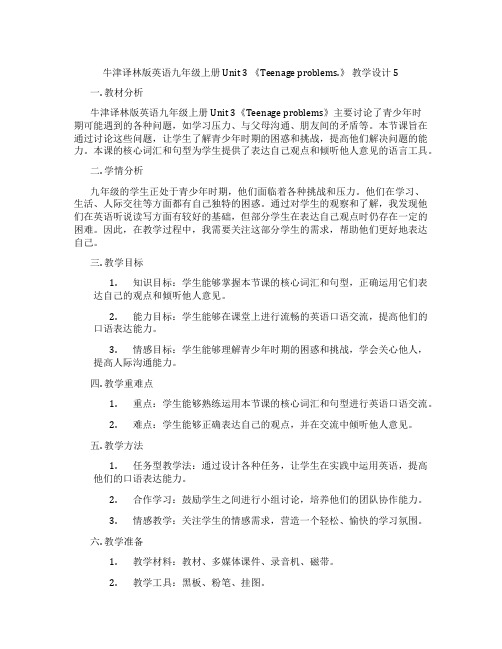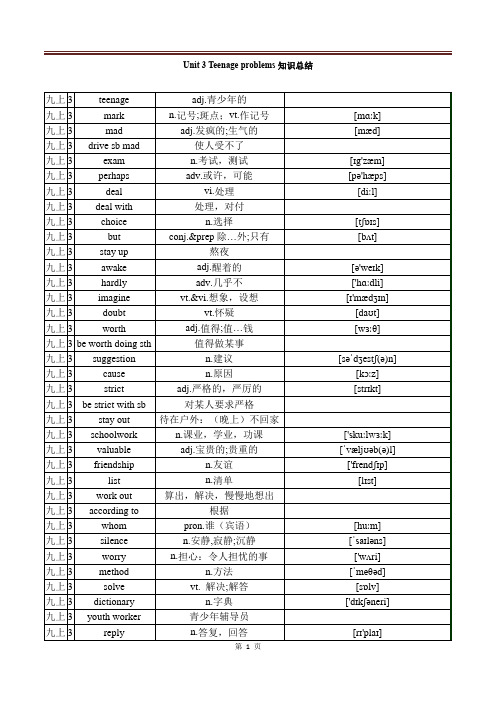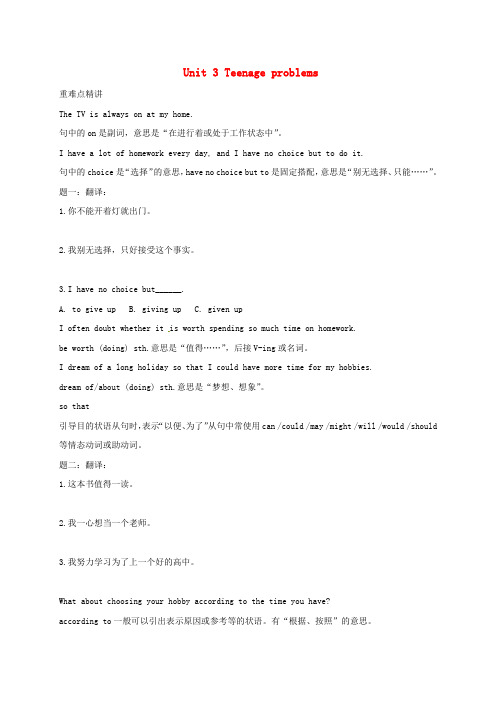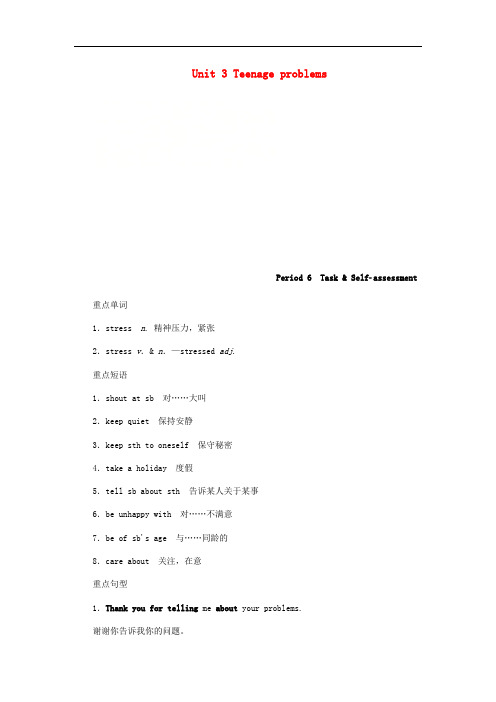九年级英语上册 Unit 3 Teennage problems Period 2教案 (新版)牛津版
牛津译林版英语九年级上册 Unit 3 《Teenage problems.》 教学设计5

牛津译林版英语九年级上册 Unit 3 《Teenage problems.》教学设计5一. 教材分析牛津译林版英语九年级上册Unit 3《Teenage problems》主要讨论了青少年时期可能遇到的各种问题,如学习压力、与父母沟通、朋友间的矛盾等。
本节课旨在通过讨论这些问题,让学生了解青少年时期的困惑和挑战,提高他们解决问题的能力。
本课的核心词汇和句型为学生提供了表达自己观点和倾听他人意见的语言工具。
二. 学情分析九年级的学生正处于青少年时期,他们面临着各种挑战和压力。
他们在学习、生活、人际交往等方面都有自己独特的困惑。
通过对学生的观察和了解,我发现他们在英语听说读写方面有较好的基础,但部分学生在表达自己观点时仍存在一定的困难。
因此,在教学过程中,我需要关注这部分学生的需求,帮助他们更好地表达自己。
三. 教学目标1.知识目标:学生能够掌握本节课的核心词汇和句型,正确运用它们表达自己的观点和倾听他人意见。
2.能力目标:学生能够在课堂上进行流畅的英语口语交流,提高他们的口语表达能力。
3.情感目标:学生能够理解青少年时期的困惑和挑战,学会关心他人,提高人际沟通能力。
四. 教学重难点1.重点:学生能够熟练运用本节课的核心词汇和句型进行英语口语交流。
2.难点:学生能够正确表达自己的观点,并在交流中倾听他人意见。
五. 教学方法1.任务型教学法:通过设计各种任务,让学生在实践中运用英语,提高他们的口语表达能力。
2.合作学习:鼓励学生之间进行小组讨论,培养他们的团队协作能力。
3.情感教学:关注学生的情感需求,营造一个轻松、愉快的学习氛围。
六. 教学准备1.教学材料:教材、多媒体课件、录音机、磁带。
2.教学工具:黑板、粉笔、挂图。
七. 教学过程1.导入(5分钟)利用多媒体展示一些青少年时期常见的问题,如学习压力、与父母沟通等。
引导学生谈论这些问题,激发他们的兴趣。
2.呈现(10分钟)呈现本节课的核心词汇和句型,让学生通过听力练习和小组讨论来熟悉这些词汇和句型。
九年级英语上册Unit 3 Teenage Problems Period 2教案 新版牛津版

Name
Simon
Grade
Hobbies
Football, _______ football and ___________ football.
Step 4: read Millie’s letter and fill in the blanket
Name
Millie
Grade
Hobbies
Problems
_____________ and hardly ____________________
Feeling
often doubt whether ______________
From your debate, we can see Milli e should achieve a balance between her hom ework and her hobbies.
Step 6:Read Simon’s let ter and find the sentences for the following.
Problems
Often _______________. However, his parents __________________ ________________________
Feeling
Feels ________________ from time to time, because he can’t understand ____________________________ ___
Teaching notes
九年级英语 Unit3 teenage problems

九年级英语Unit3 teenage problemsPeriod One(Welcome to the unit/ vocabulary )●objectives1.to talk about problems and their causes2.to think about personal problems and how to deal with them.3.To understand the different meanings of the verb “to be”4.To use the verb “to get” when talking about problems●Language function and focusI’ve got a problem.=I have a problem.Eating too much makes you unhealthy. Get too many tests and examsQuarrel with sb. Family membersGet a bus=take a bus get angry=become angryI don’t have much time to revise for tests.●Teaching methodsListening/ writing/ speaking/discussing●Teaching proceduresPart A1.Explain that most teenagers have problems. Tell students that if they ever need to talk about theirproblems, they should talk to their teachers, friends or family. Tell students that having a problem is nothing to be ashamed if ----everyone has worries from time to time.2.Ask students work in groups. Discuss their problems and write on the paper. The teacher callsome groups to speak out the problems and help them how to solve them.3.Show the students pictures about problems. Ask individuals to speak out which problem it is. Ifone has spoken out, he or she can ask his or her best friend to speak out next problem.4.Ask students to work in pairs to complete Part A on Page 39. Once all students have finished,ask one student at a time to read out what they have written. Listen for mistakes and mispronunciation.Part B1.tell students you want to do a survey of the problems that students in the class have. Write thefollowing headings on the board:Not enough sleepNot enough time to do homeworkToo noisy to studyLonelyArgue with cousin/classmate/parentParents are always busyRead out each problem in turn, and ask students to raise their hands if they have this problem. Make a tally of the problems that students have. This will reinforce a group feeling. Finally, make a note of the biggest problem the class has. Write the following on the board:“The biggest problem Class …Grade ... has is …”2.Explain that part B is different from the previous exercise, as students have to rank how bigthese problems are in their lives.Explain to students that number 5 means that this is a big problem for them while number 1 means it is a small problem.3.Tell students to complete Part B on their own. You may want to give the exercise as homework,as students may feel comfortable writing about their problems in private. You could ask volunteers to give their answers but do not force students. If there are no volunteers, do not go over the answers to this exercise with the class. Keep the students’ answers confidential.4.For stronger classes, ask students to add what they consider to be the biggest problems teenagersface to the list if these are different to those on the list.V ocabularyPart A1.Explain that the words in the box at the top of Page 44 are synonyms of the verb “to get” belowthe pictures, and can be used to replace “get” in each picture.2.Ask students to work in pairs to complete Part A.3.For weaker classes, ask students to read out the answer for each picture. For stronger classes,after students have read out the answers, ask them to make sentences using the phrases under the pictures.Part B1.Explain to students that they can use their answers from Part A to help then with the exercise inPart B. for weaker classes, students can work in pairs to complete Part B. For stronger classes, students can work on their own.2.For stronger classes, once students have finished, ask two students to read out the whole letter.Compliment them on parts of the letter they read particularly well.3.For weaker classes, ask students if they have the same problems as Amy. Ask students to raisetheir hands if they do. For stronger classes, ask students what their advice would be for Amy. Comic strip1.Play the tape for the students to find out the problem. If they can’t get the answer, the teachercan play the second time.2.Explain some language points for the whole class. Then ask them to try to perform this shortplay.Homework:1.If you have any ___________ (问题),you can ask your teacher for help.2.Eating too much is bad for our ____________. It makes us __________ (健康)3.____________ (游泳) is one of my favourite sports.4.John got up too late to have breakfast, so he felt ___________ at school.5.The meeting has bee ___________ (结束) for two hours.6.Thank you for ___________ (邀请) me to your party.7.You must look after y_________ and keep healthy, Mum and Dad.8.We have our first class at a _____________ (一分钟)to eight.Design on Bbproblemstoo noisy after classDon’don’后记:通过这堂课使我了解到学生中的各个问题和他们的想法。
Unit 3 Teenage problems知识总结 牛津译林版英语九年级上册

Unit 3 Teenage problems知识总结中文英文值得做某事be worth doing sth别无选择只能做have no choice but to do sth把某人逼疯drive sb. mad处理deal with熬夜stay up呆在户外/晚上不回家stay out对某人要求严格be strict with sb算出/解决work out嘲笑laugh at根据according to复习/回顾/仔细检查go over不客气don’t mention it许多与我们同龄的学生many students of our age取得更大的进步make greater progress少吃多运动eat less and exercise more感到孤独feel lonely高/低/满分low/high/full/top marks更合理安排你的时间manage your time better无法想象没有爱好的生活can’t imagine my life without hobbies毫无疑问no doubt /without doubt给我提供一些有价值的建议offer me some valuable suggestions/advice对足球痴迷be crazy about football我问题的根源the cause of my problem陷入麻烦get into trouble对我要严格be strict with me培养/发展我们的爱好develop our hobbies在我的学业和我的爱好间取得平衡achieve a balance between my schoolwork and my hobbies表达自己有困难have difficulty expressing myself解决问题的一个好方法 a good method of (for) solving the problem喜欢英语、数学和化学love English, Maths and Chemistry优等生top students写一封回信write a reply不要理会那些嘲笑你的同学pay no attention to those classmates who laugh at you 觉得运动困难find sport difficult以……而骄傲/自豪be proud of/take pride in读出声read aloud把所有单词读正确pronounce all the words correctly通过考试/考试不及格pass/fail an exam预测结果predict a result。
2022九年级英语上册Unit3Teenageproblems讲义(附答案)

Unit 3 Teenage problems重难点精讲The TV is always on at my home.句中的on是副词,意思是“在进行着或处于工作状态中”。
I have a lot of homework every day, and I have no choice but to do it.句中的choice是“选择”的意思,have no choice but to是固定搭配,意思是“别无选择、只能……”。
题一:翻译:1.你不能开着灯就出门。
2.我别无选择,只好接受这个事实。
3.I have no choice but______.A. to give upB. giving upC. given upI often doubt whether it is worth spending so much time on homework.be worth (doing) sth.意思是“值得……”,后接V-ing或名词。
I dream of a long holiday so that I could have more time for my hobbies.dream of/about (doing) sth.意思是“梦想、想象”。
so that引导目的状语从句时,表示“以便、为了”从句中常使用can /could /may /might /will /would /should 等情态动词或助动词。
题二:翻译:1.这本书值得一读。
2.我一心想当一个老师。
3.我努力学习为了上一个好的高中。
What about choosing your hobby according to the time you have?according to一般可以引出表示原因或参考等的状语。
有“根据、按照”的意思。
Many students of our age have this problem.句中of our age是后置______,意思是“和……同龄的”。
九年级英语上册Unit3TeenageproblemsPeriod5Integratedskill

九年级英语上册Unit 3 Teenage problems Period 5 Integrated skills & Study skills课时训练(新版)牛津版编辑整理:尊敬的读者朋友们:这里是精品文档编辑中心,本文档内容是由我和我的同事精心编辑整理后发布的,发布之前我们对文中内容进行仔细校对,但是难免会有疏漏的地方,但是任然希望(九年级英语上册Unit 3 Teenage problems Period 5 Integrated skills & Study skills课时训练(新版)牛津版)的内容能够给您的工作和学习带来便利。
同时也真诚的希望收到您的建议和反馈,这将是我们进步的源泉,前进的动力。
本文可编辑可修改,如果觉得对您有帮助请收藏以便随时查阅,最后祝您生活愉快业绩进步,以下为九年级英语上册Unit 3 Teenage problems Period 5 Integrated skills & Study skills课时训练(新版)牛津版的全部内容。
Unit 3 Teenage problemsPeriod 5 Integrated skills & Study skillsⅠ。
根据句意及汉语或首字母提示完成句子1. (2016·烟台)John is interested in ________ (化学).2. (2016·无锡)To my surprise, the 3。
yearold boy can spell all those words ________ (正确地)。
3. Daniel has made little ________ (进步) in his English. He feels sad。
4。
What other art forms are ________ (提及) in this speech?5。
译林版英语九年级(上)Unit 3 Teenage problems 知识点

译林版英语九年级(上)Unit3Teenage problems知识点一.重点词组1.吃的太多/很多e at too much/a lot2.征求意见a sk for advice/suggestions3.怎样解决他们的问题how to solve/deal with their problems4.亲密的/真正的朋友c lose/true friends5.在考试中得高\低分get h igh\low marks i n e xams6.更好地规划你的时间manage your time better7.怎样处理...how to deal with...=what to do with...8.熬夜晚stay up late9.呆在外面晚stay out late10.有空余时间进行业余爱好have some spare time for my hobbies11.值得做某事b e worth doing sth.12.给我提供一些建议offer me s ome s uggestions13.收到某人的来信h ear from sb.14.痴迷于做某事b e crazy about doing sth.15.陷入困境get into trouble/be in trouble16.在……之间取得/保持平衡achieve/keep a balance between...and...17.允许某人做某事a llow sb.to do sth.18.对某人某事严格b e strict with sb.in sth.19.发展兴趣爱好d evelop hobbies20.列一张...的清单m ake a list of...21.表达自己的观点e xpress oneself22.不注意...pay no attention to(sth./doing sth.) 23.在某事上没有进步make little progress in sth.24.与某人分担焦虑s hare worries with s b.25.将担心放在自己心里keep worries to oneself26.对你的体重不满意be unhappy with your weight27.对……感到有压力f eel stressed about...二、重点句型1.W hy not/Why don’t you eat less and exercise more?为什么不少吃多锻炼呢?2.I don’t get enough sleep.我得不到足够的睡眠。
牛津译林版九年级英语上册 Unit 3 《Teenage problems.》Lesson 3教学设

牛津译林版九年级英语上册 Unit 3 《Teenage problems.》Lesson 3教学设计一. 教材分析《牛津译林版九年级英语上册 Unit 3 Teenage problems. Lesson 3》主要讲述了青少年面临的一些普遍问题,如学习压力、与父母沟通、早恋等,并通过对话形式展示了如何在面对这些问题时进行积极的沟通和解决。
本课内容贴近学生生活,有利于激发学生的学习兴趣,提高他们的语言运用能力。
二. 学情分析九年级的学生已经具备了一定的英语基础,能够理解和运用一些基本的英语句型和词汇。
但同时,他们在学习过程中仍存在一些问题,如:部分学生对英语学习缺乏兴趣,课堂参与度不高;部分学生英语口语表达能力较弱,不敢开口说英语;部分学生对一些英语语法和词汇掌握不扎实,影响阅读和听力理解。
三. 教学目标1.知识目标:学生能够掌握本课中的关键词汇和句型,理解对话内容,能够运用所学知识进行简单的日常交流。
2.能力目标:通过听力、口语、阅读和写作等实践活动,提高学生的英语运用能力。
3.情感目标:培养学生积极面对生活中问题的态度,学会与父母、朋友有效沟通,促进全面发展。
四. 教学重难点1.重点:关键词汇和句型的掌握,对话内容的理解。
2.难点:情态动词 could 的用法,以及如何在实际情境中运用本课所学知识。
五. 教学方法1.情境教学法:通过设定真实的生活情境,让学生在实际语境中学习和运用英语。
2.交际法:鼓励学生积极参与课堂对话,提高他们的口语表达能力。
3.任务型教学法:通过完成各种任务,培养学生运用英语解决问题的能力。
六. 教学准备1.教学课件:制作课件,包括图片、视频、音频等素材,以便于教学展示。
2.教学道具:准备相关的生活用品,如书包、手机等,用于模拟生活情境。
3.作业布置:提前布置预习任务,让学生预习本课内容,为课堂学习做好准备。
七. 教学过程1.导入(5分钟)利用图片和视频展示青少年面临的一些问题,如学习压力、与父母沟通等,引导学生思考并讨论这些问题。
九年级英语上册 Unit 3 Teenage problems Integrated skills教案 (新版)牛津版

Unit 3 Teenage problemsIntegrated skillsI. Teaching aims and learning objectivesBy the end of the lesson, students should be able to:1. Extract information from the listening material and take notes;2. Talk about their own problems and try to deal with the problems;3. Develop the abilities of listening, speaking, reading and writing.II. Teaching contents1.New words and phrases: chemistry, progress, worried, aloud, pronounce,correctly,pronunciation, laugh at, pay no attention to, go over 2. New structures: Perhaps you should go over what you’ve learnt as often as possible.Try to pronounce all the words correctly.Don’t mention it.III. Focus of the lesson and predicted area of difficultyTalk about the students’ own problems and try to deal with the problems.IV. Teaching proceduresStep 1 Have a free talkT: Do you have any problems in your life? What are your problems? How do you usually deal with them?S: I often …T: In fact, if we can’t solve our problems, we may ask Mr. Friend, a youth worker, for suggestions. Now the Youth Worker Club needs volunteers. If you succeed in doing all the tasks in this class, you can join the Youth Worker Club.【设计意图:由谈论生活中的问题及处理方法导入新课,用任务型教学模式激发学生的学习兴趣与动力。
九年级英语上册 Unit 3 Teenage problems Period 6 Task

Unit 3 Teenage problems
Period 6Task & Selfassessment 重点单词
1.stress n. 精神压力,紧张
2.stress v.& n.—stressed adj.
重点短语
1.shout at sb 对……大叫
2.keep quiet 保持安静
3.keep sth to oneself 保守秘密
4.take a holiday 度假
5.tell sb about sth 告诉某人关于某事
6.be unhappy with 对……不满意
7.be of sb's age 与……同龄的
8.care about 关注,在意
重点句型
1.Thank you for telling me about your problems.
谢谢你告诉我你的问题。
2.You are unhappy with your weight.
你对自己的体重不满意。
3.Many students of our age have this problem.
很多和我们同龄的学生有这样的问题。
公交小句
1.You care too much about your homework.
你太在意你的家庭作业了。
2.If you keep your worries to yourself, you'll feel more tired. 如果你把烦恼埋藏在心中,你会感到更累。
3.Our team would be happy to help you with your study.
我们的团队很高兴能帮助你学习。
九年级英语上册Unit3Teenageproblem

Differences in making friends or fitting in with peers can lead to feelings of loneliness and exclusion
Bullying
The experience of being bullied or bulling others can have long term psychological effects on teenagers
• Enhancing Social Skills: By addressing problems like social anxiety and peer pressure, teachers can develop better social skills and build meaningful relationships with others
Parents often fail to understand and communicate with their
young children, leading to misunderstandings and emotional
distance
02
Parenting style
Some parents may opt for an authoritative or permissive
• Improving Academic Performance: Addressing issues like stress and anxiety can help teenagers to better focus on their studies and improve their academic performance
- 1、下载文档前请自行甄别文档内容的完整性,平台不提供额外的编辑、内容补充、找答案等附加服务。
- 2、"仅部分预览"的文档,不可在线预览部分如存在完整性等问题,可反馈申请退款(可完整预览的文档不适用该条件!)。
- 3、如文档侵犯您的权益,请联系客服反馈,我们会尽快为您处理(人工客服工作时间:9:00-18:30)。
抽时间找学生聊天,帮助他们解决问题,培养他们关爱他人,关爱社会的意识,使其积极健康的成长!
练习安排
1.Read the text frequently after class.
2. Try to find out more about teenage problems.
板书设计
Unit 3 Tennage problems Period2
Some questions about Millie:
1. What problem does Millie :
1. Is Simon crazy about football?
2. How long does Simon play football every day?
What about choosing your hobby according to the time you time?
I hope you think my advice is worth taking.
2.技能目标:
1)通过图片、标题和上下文猜测课文大意;
2)谈论中学生在学习、交友与家人的关系等方面所遇到的问题。
2、再次播放录音内容.
Mr Friend wants to keep a record of each student. Look at the cards and :
1. Is Simon crazy about football?
2. How long does Simon play football every day?
I am crazy about football.
I do not understand why they are so strict with me.
I wonder achieve a balance between my schoolwork and my work out how much time you need to finish it all.
Unit 3 Tennage problems Period2
教学
hoice, but, awake, , cause, strict, schoolwork, valuable, friendship, list,
学习词组:deal with, stay up late, stay awake, doubt whether it is worth spending so much time on .
Step1:Lead-in
Make a free talk with them.
Step2
任务一:读前准备。
1、校对预习检测答案。
2、自由讨论。
•1.Do you go to ask for some advice?
任务二:阅读课文。
1、播放第一部分的录音,了解书信的大意。
Millie and Simon to to the letters and match the words on the left with the meanings on the right (Part B1).
3.情感目标:(1).学会表达自己的烦恼和情感并向别人寻求建议。
(2)培养学生积极向上健康的心理
重点难点分析
1.知识目标+技能目标
2了解青少年常遇到的一些困惑和烦恼,思考如何正确面对这些问题
3.培养学生关爱社会,关爱他人,爱护环境的意识
教学流程安排
集体智慧
(以知识体系为主)
个性设计
(二次备课)
教学后记
3. What do Simon’s parents not allow’s parents understand have?
4、Watch and practice after the tape.
备课组长审核签名:年级主任复核签名:
3. What do Simon’s parents not allow’s parents understand’t ________________ it because she understands that it is important to do time. She often stays up late to _____________ the exercises. However, she is so ____________ football that feels stressed and angry _______________. He thinks his school work and his hobbies.
导入新颖,从容自然。
讨论问题设置一般疑问句太简单,应多用特殊疑问句。
Ask them to read the passage aloud.
学生听力较差,反复播放录音,让学生搜索答案
本练习有点难度,教师要耐心指导
If them need, I will .
They are interested in talking about their problems.I will make them to learn about the letters
